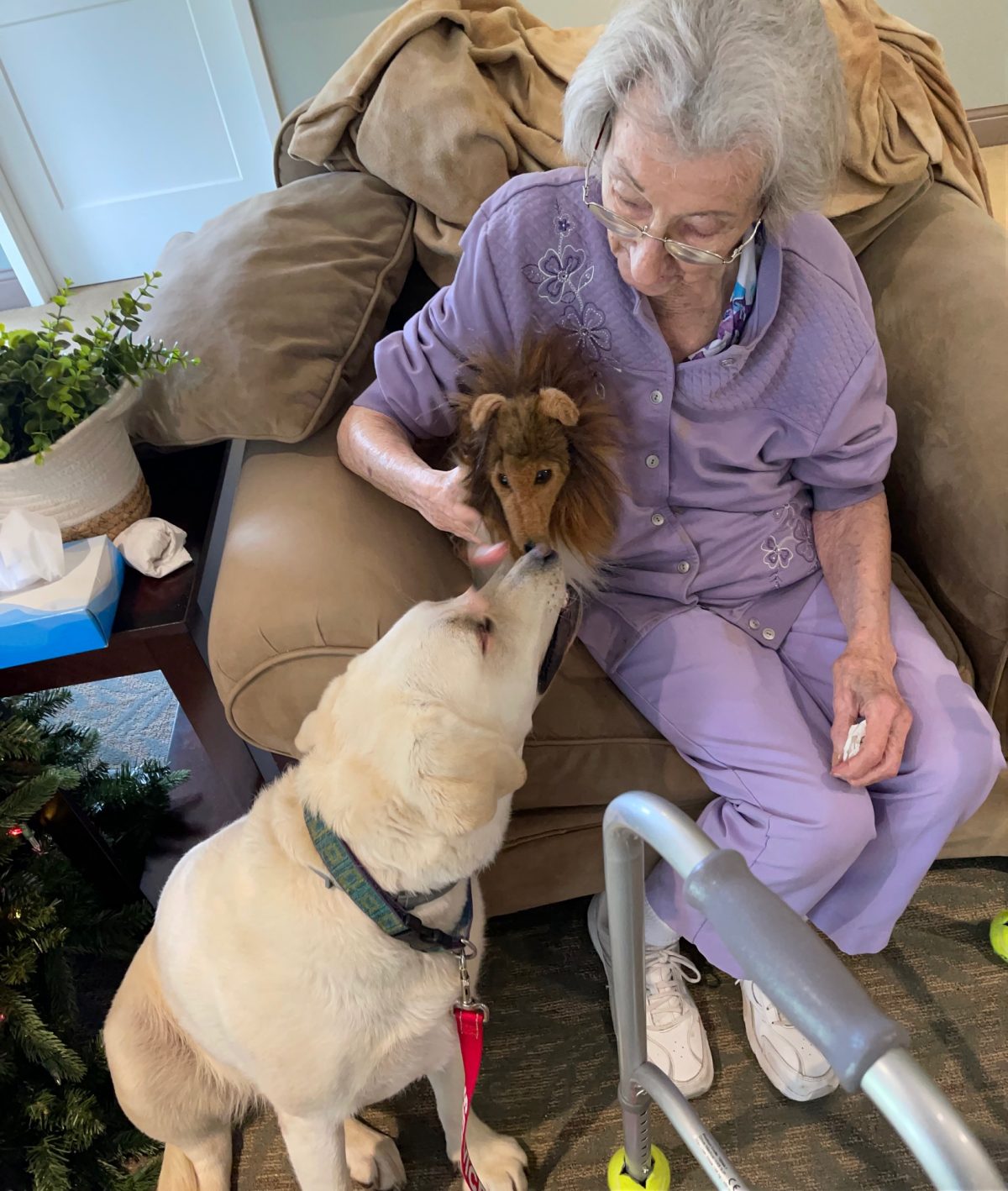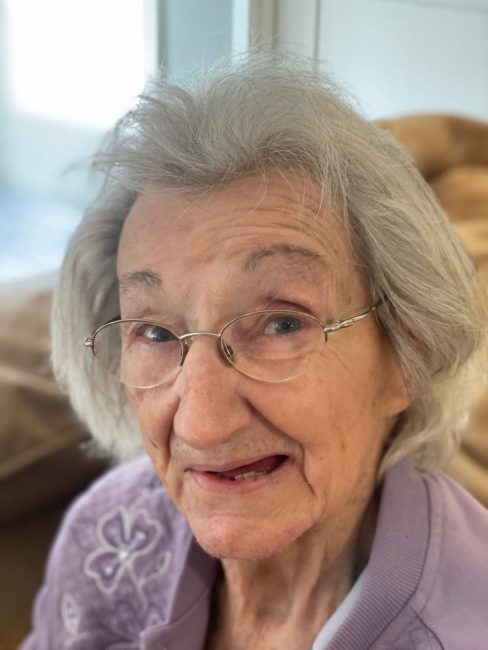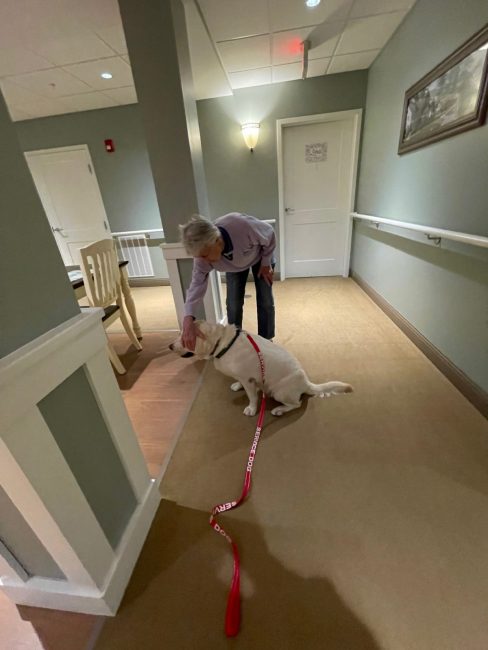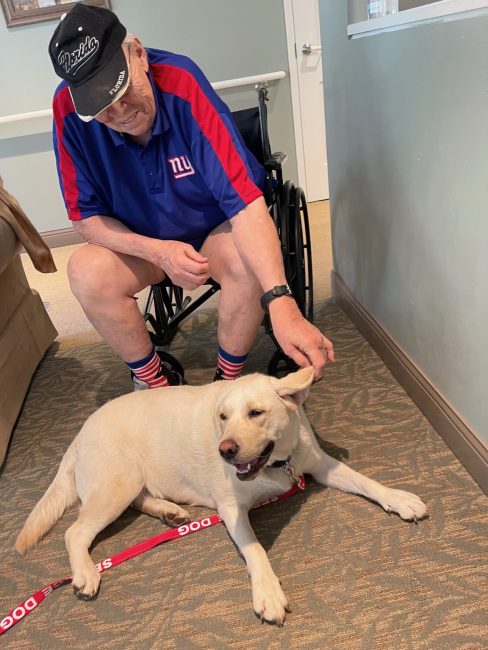Walking into the Mansion Memory Care unit, I sometimes feel like I’m passing through a portal to another world. Inside, there is silence, six people sitting on chairs and sofas in a half-circle, all facing one another.
Like all great working dogs, Zinnia shifts gears gets calm and serious, and looks around for someone to visit. Her eyes settle on Lois, who lights up with joy at the sight of Zinnia.
She is holding a stuffed animal, either a collie or a fox (a collie, I think.)
Zinnia makes eye contact and heads straight for her. Like all good therapy dogs, she knows who to see and who to leave alone. A woman stares at Zinnia from a chair across the room. She looks away. Zinnia ignores her.
Memory care is a special place, not like any other place. It has a quiet, spiritual, almost temple-like feeling about it. Time seems to move slowly and deliberately there.
The building is new; the rooms are beautiful and carefully constructed. Every room is in a circle; it is not possible to get lost.
The playroom is stuffed with toys, puzzles, picture books, and magazines.
Some residents stare vacantly ahead, their eyes open, but it’s not clear what they see. Two are dog lovers; they pepper me with questions about Zinnia, sometimes asking the same ones repeatedly.
They live in a different reality, each separate from the others. The aides sit quietly with them, keeping them company, asking them questions, reassuring them when they get confused or nervous.
Two of them are happy to see Zinnia. They ask me over and over again if the dog is a he or a she. And what is her name? And will she have babies? And where did I get here? And what did she cost?
Lois has a babyfur collie in her arms, and she holds her tightly, making sure Zinnia is friendly. Zinnia is very friendly; she licks Lois’s hand and sniffs Toby, the fox.
Ron comes out in his wheelchair. He is happy to see Zinnia; he wants to know if she can stay with him for a few days. If not, he will be happy to buy one of her puppies. Would I sell him one?
Sure, I said, but I’m not sure the health department would allow a puppy in Memory Care. He stares at me for a few moments, trying to recall something he knows. Then he gives it up, sighing.
(Above, Sylvia comes out of her room to meet Zinnia, to pet her. Zinnia stays absolutely still.)
I find that dogs bring up memories faster than almost anything else. I find that the love of a dog never dies, and by bringing Zinnia, I bring love and memories; I see the lights come on.
It is a worthwhile thing to do.
I love the peace and quiet in Memory Care. The aides, like the volunteers, are well trained in dealing with memory loss. The rule i you go where they do; you don’t correct them or argue with them or try to change their minds.
The Mansion staff asked me to visit their new Memory Care Center (named in honor of the Army Of Good) for a week or so; I was too busy. Today, I was seized by an inspiration: Zinnia and I were going to go there at least twice a week, starting today.
(Above, Sylvia comes out of her room to meet Zinnia, touch her, and feel her softness. Zinnia stays absolutely still.)
After lunch, we went there and spent a couple of hours with the six residents currently living there. Lois had been waiting for Zinnia for days; according to the aides, she was excited. So was Ron, who volunteered to take care of Zinnia for a few days.
Some of the residents sat quietly, they never spoke or moved, yet they seemed peaceful and at ease. The aides pay special attention to them, talking to them, asking them questions, offering the games, getting them to walk or sit outside.
One resident suddenly cries; she misses her house, her family, she wonders where they are. She wonders if they still love her. Joan, one of the aides, sits with her and puts her arm around her. It’s okay, she says; her family loves her. They want her to be safe and cared for.
Why do they never visit me? she asks Joan. “They were here yesterday and also on Friday,” she says. They love you very much and come here all the time.”
As Joan and the resident hold hands, the resident turns to Joan. “Why don’t they visit me?”
“They visit you all the time,” says Joan, “they love you very much.”
In Memory Care, a modern, brightly facility built especially for the memory-impaired, there are games and puzzles around, markers to help the residents navigate and recognize their rooms.
Zinnia and I walk past Lois again. “Is the dog they? She asks me again. She is a “she,” I say, pulling up my mask a bit to make sure I can be heard.
Ron comes to me again; he asks again if Zinnia can sleep over. He tells me he is not a resident but an employee; he helps out whenever he can and won’t charge for his work.
I find that I love visiting memory care with Zinnia. It feels special to me, a small act of great and appreciated kindness.
Zinnia and I will start going there regularly next week, at least two times a week.
The residents love company, and most love the sight of the dog. Most of them do recognize me but don’t know my name.
I’m not sure anyone of them has ever asked my name. Over time, we’ll get to be familiar with one another; they will know me by sight and sound, they will almost certainly know Zinnia.
I remember my talks with the social workers. Don’t correct them or try to challenge or educate them. Go where they go. Let them get to know you, and they will come to love you, whether they remember you or not.
Good advice.
I want the Memory Care unit to be a regular part of my life. This is how I can stay grounded and remember what is important.





I’ve been working with someone for over 3 years and I don’t think he knows my name. He does however recognize me and always thanks me for stopping by. He’s 101 years young. I volunteer for our local hospice. Just a quick note, I think the “fox” that Louis has is actually a collie? I love your writings.
Thanks Sunset, I think you’re right about the collie..I appreciate the note..
My mom had dementia, she only lasted 17 months after my dad passed,, but it was the best quality time I had with her. She and my dad wanted to die at home and I made that promise and kept it. My mom slowly stopped doing things, reading the paper, remembering how to get dressed, stopped walking and finally was bed ridden and eventually stopped talking. She knew who I was and even though she sat quietly, I did all the talking and those are the memories I have to fill the hole in my heart.
It’s a great kindness, Jon. I had an aunt who spent her life caring for others, as a nurse in WW2 and then in her home county where she cared for my grandmother and her invalid brother. When she finally retired she developed Alzheimer’s within a short time. It seemed so terribly unfair. The people who work in memory loss homes are saints. It takes a special sort of devotion and love. I am terrified of losing my memory. (My mother and other aunt were not as severely afflicted but they also had memory loss.) Bless you for what you do.
Your whole vibe has changed since you’ve started deleting the haters! So wonderful! Love hearing about your life, and Maria’s too! Love and Spirit Fuel to you All !??♥️
Thanks Alexa, I feel lighter and calmer..good for the head…
What a wonderful story.
Although science and especially medicine are in the early stage of correctly diagnosing and healing memory loss ( and every shopkeeper seems to think he’s an expert and many commercial elder “homes” pretend their workers are experts and know best what is good when it is often just a Cuckoo’s Nest ), there is a lot of good advice in this video about talking to someone with dementia. https://youtu.be/yo3fNtN1g-M